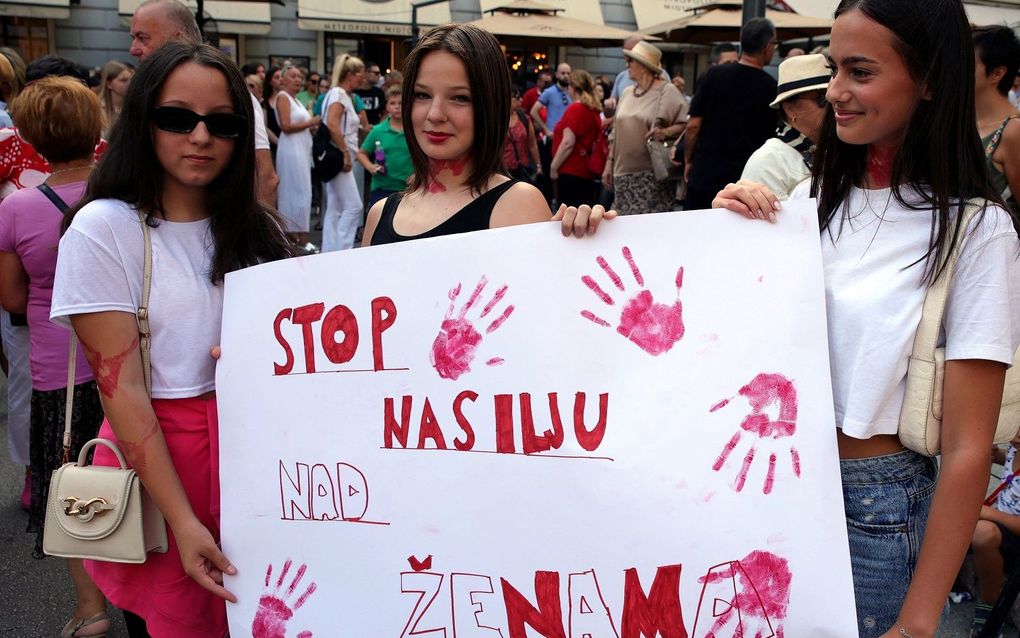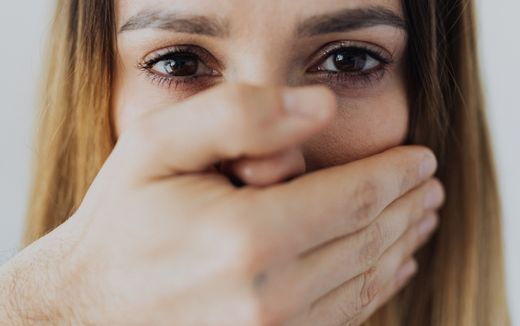Column from Sarajevo: Why a man kills the woman he loves

Thousands of people took part in a march in Sarajevo, on August 14, 2023, to show solidarity two days after a woman was murdered by her partner who livestreamed her killing on social media before killing two men and himself. Protesters held up placards emblazoned with messages such as "Stop femicide", "Say no to violence" and "Silence is complicity". Photo AFP, Elvis Barukcic
Christian Life
Once upon a time, there was a wealthy man who got married six times. All his beautiful brides disappeared one by one. The seventh wife discovers something terrible. This tale set columnist Mirela Popaja to thinking.
The wealthy husband named Bluebeard tells his seventh wife that she can open all the doors in her new house, except for one. He then leaves her all the keys, including the one to the forbidden room and goes on a trip. The wife, after seeing all the other rooms, was overcome with curiosity and decided to open the forbidden room. To her horror, she found that the room was filled with the corpses of Bluebeard's previous wives.
A couple of weeks ago, I had the opportunity to be part of this very intriguing play based on a French folktale called "Bluebeard". The play addressed the ongoing tragedy of femicide in the Balkan region. Just in the last months, there have been six murders of women, all committed by their current partners or their exes. And yet, femicide is not recognised in Bosnia and Herzegovina as a crime.
The frequency of femicide is growing in the Balkans. It does not help that we still live in a deeply patriarchal society where a woman needs to know her place and endure abuse and mistreatment because, after all, the man is the head of the house, and women need to submit to authority.
Intimate partners
Unfortunately, this is not just a Balkan problem – men abusing and even killing their female partners is a worldwide phenomenon too little spoken of and too little recognised.
I spoke to my friend, who is from Mexico, and the stories she shared from her home country are equally gruesome and shocking. Estimates published by WHO indicate that about 1 in 3 (30 per cent) of women worldwide have been subjected to either physical and/or sexual violence in their lifetime, most of which was inflicted on them by intimate partners. In addition, almost the same percentage (27 per cent) of women aged 15-49 years who have been in a relationship, report that they have been subjected to some form of physical and/or sexual violence by their intimate partner.
Perpetrator
The immediate question that comes to my mind is: Are women such a big threat to men that this kind of violence is really necessary? Or why is there so much hatred towards women? What could possibly make a man want to murder his current partner or his ex-wife, former girlfriend, or ex-partner? These questions unearth even deeper lines of inquiry for me.
And maybe this is controversial, but this time I don't want to focus on the victim. I want to focus on the perpetrator, on the one that committed the crime: the Bluebeard himself. Not because the victim doesn't matter. On the contrary, I am asking these questions so that maybe one day, the world we live in will be safe for women.
Bluebeard is obviously just a character in a play, an extreme personality with extremely unsettling habits that are meant to shock the viewer and leave a distinct impression on play critics.
Repetitive violence
Yet, as plays so often do, the tale of Bluebeard and his wives has a grain of truth in it: men have killed their wives and still do. We clearly see this today. So we must ask, what kind of a society do we live in that could produce men who murder life-long partners? What are our educational, cultural, and political systems teaching men?
For as long as history has known, men have been exposed to repetitive violence. They are called to battlefields because other men have wanted to keep or steal power. In addition, of course, the simultaneous cultural pressure on men demanded stoicism and heroism – don't cry, suppress emotions, be strong, never admit you have a problem, take it like a man.
In the field of epigenetics, that centuries-old cycle means that the trauma men carry from those experiences has been passed on from generation to generation, even to those who are not being physically enlisted in a current war.
Vulnerable
After centuries of grooming men to be merciless, strong heroes on the battlefield, it is no wonder we are where we are. Men need space to learn how to deal with themselves and others in healthy ways rather than bottling up emotions or channelling pent-up desires, fears, and anger into destruction. It is about time for us, as a society, to focus our energy on allowing men to express themselves and share their fears, sorrows, hopes and dreams without judgment. It is critical that we affirm again and again that they are still men, even when they are vulnerable.
I want to believe there is still hope for men. It is time to dismantle the system that no longer serves us and start working on healthier communities.
I understand we have a lot of work to do. But the way to the summit starts with taking a first step at the feet of the mountain. We can start small and encourage boys and men to explore and share their emotions without judgment so we can break the cycles of trauma and have a healthier relationship between the sexes and eventually within society as a whole.
Related Articles










